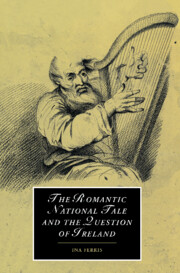Book contents
- Frontmatter
- Contents
- Acknowledgments
- Introduction: the awkward space of Union
- 1 Civic travels: the Irish tour and the new United Kingdom
- 2 Public address: the national tale and the pragmatics of sympathy
- 3 Female agents: rewriting the national heroine in Morgan's later fiction
- 4 The shudder of history: Irish Gothic and ruin writing
- 5 Agitated bodies: the Emancipation debate and novels of insurgency in the 1820s
- Notes
- Bibliography
- Index
- CAMBRIDGE STUDIES IN ROMANTICISM
2 - Public address: the national tale and the pragmatics of sympathy
Published online by Cambridge University Press: 22 September 2009
- Frontmatter
- Contents
- Acknowledgments
- Introduction: the awkward space of Union
- 1 Civic travels: the Irish tour and the new United Kingdom
- 2 Public address: the national tale and the pragmatics of sympathy
- 3 Female agents: rewriting the national heroine in Morgan's later fiction
- 4 The shudder of history: Irish Gothic and ruin writing
- 5 Agitated bodies: the Emancipation debate and novels of insurgency in the 1820s
- Notes
- Bibliography
- Index
- CAMBRIDGE STUDIES IN ROMANTICISM
Summary
It is pleasant, after ages of bad romance in politics, to find thus, at last, good politics in romance.
Thomas Moore “Irish Novels,” Edinburgh Review (1826)The politics Thomas Moore specifically had in mind when he made this remark was the support for Catholic Emancipation in the novels under review, and his comment underlines the way in which Irish fiction in the early decades of the nineteenth century was immediately understood by contemporary readers within the matrix of post-Union civic discourse. It is not incidental that the paradigmatic The Wild Irish Girl: A National Tale appeared in 1806, the year following the renewal of Catholic agitation, nor that its publisher, Richard Phillips (earlier imprisoned for selling Tom Paine's Rights of Man), advertised the novel among a list of useful and valuable books, all non-fiction and mostly travels, appended to John Carr's The Stranger in Ireland. Later readers, however, have been rather less sure than was Moore that the line of fiction inaugurated by Sydney Owenson (Lady Morgan) and her compatriot Maria Edgeworth does in fact represent “good politics in romance.” Famously dismissed by Daniel Corkery in the 1930s as mere “traveller's tales” exhibiting Ireland to “alien eyes,” early nineteenth-century Irish fictions continue to be regarded with a certain distrust in both Irish and British Romantic studies (Edgeworth is perhaps a partial exception).
- Type
- Chapter
- Information
- The Romantic National Tale and the Question of Ireland , pp. 46 - 73Publisher: Cambridge University PressPrint publication year: 2002



